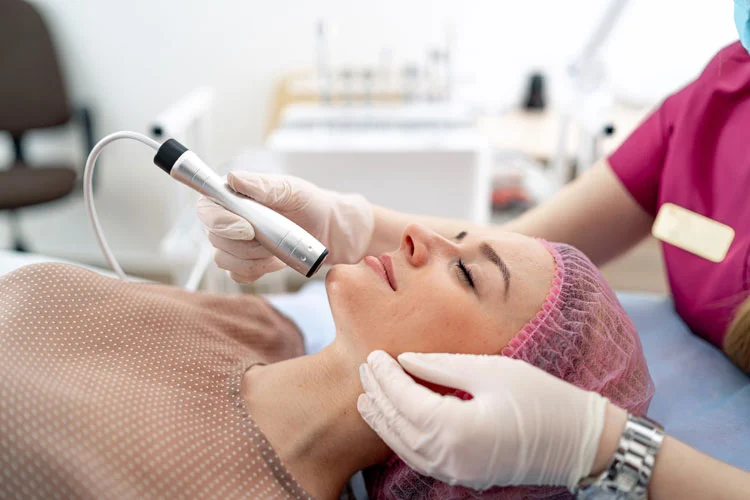Everything You Need To Know About Peptide Therapy
What is Peptide Therapy?
Peptide therapy is a regenerative treatment to help your body recover, increase energy and strength, promote hair growth, and more.

Peptide therapy is anti-aging and uses different peptides to combat some of the most common signs of aging while also improving body composition and increasing energy levels.
They can improve the skin, promote and improve sex life, help you reach your body composition goals, and help you recover fast after an injury.
As you age, your body slows human growth hormone production. Growth hormone releasing hormone plays a part in many different aspects of health and well-being, including:
- Weight management
- Pain management
- Overall health and wellness
- Age management
- Management of chronic illness symptoms
What is Peptide Therapy used for?

Beginning a treatment plan with peptide therapy provides the body with many different benefits. This anti-aging treatment is safe, effective, and can deliver incredible results physically, mentally, and emotionally.
The use of therapeutic peptides can boost libido, improve the quality of your skin, help you transform your physique, and increase your energy levels. Specifically, the different peptides that we offer can deliver some of the following benefits:
- Correct hormonal imbalances
- Improve mental clarity and cognition
- Improve bone density
- Increase skin elasticity
- Increase growth hormone releasing peptide
- Lower body fat percentages
- Repair body tissues after injury
- Treat the symptoms of joint and muscle pain
- Improve muscle tone and strength
- Promote healthy skin with fewer wrinkles
- Increase sex drive
- Ward off inflammation
- Increase energy levels
Why Choose Peptide Therapy?
Peptide therapy is part of a revolutionary, cutting-edge science of cell-signaling amino acid sequences (known as peptides). Peptides are the master controls of many functions in the body.
What are Peptides Made Of?
Peptides are the building blocks of proteins and are composed of amino acids that work to regulate a variety of biological functions and processes.
These naturally occurring peptides act as signaling molecules within the body and instruct other cells and molecules on what functions to perform.
There are over 7,000 known peptides within the human body and though some may be similar each is responsible for facilitating a different response and action within the body.
Some common functions of peptides include providing pain relief, triggering immune system function, aiding in soft tissue repair, accelerating healing processes, engaging the pituitary gland, promoting weight loss and lean muscle gain, reversing symptoms of sexual dysfunction, and improving hormone production and cognitive function.
Short Chain Amino Acids
A peptide is a short chain of amino acids. The amino acids in a peptide are connected to one another in a sequence by bonds called peptide bonds.
Typically, peptides are distinguished from proteins by their shorter length, although the cut-off number of amino acids for de fining a peptide and protein can be arbitrary.

Peptides are generally considered to be short chains of two or more amino acids. Meanwhile, proteins are long molecules made up of multiple peptide subunits and are also known as polypeptides.
Proteins can be digested by enzymes (other proteins) into short peptide fragments. Among cells, peptides can perform biological functions. For example, some peptides act as hormones, which are molecules that when released from cells affect other areas of the body.
Muscle Mass
Muscles are often described as the “engine” of your body’s fat and calorie-burning mechanism. Increased muscle mass can lead to less body fat, a stronger immune system, improved energy levels, and reduced stress.
After you turn 40 and continue to age, you lose approximately 1 percent of your bone mass each year. This makes your bones more prone to fractures and may lead to osteoporosis over time.
Increasing muscle mass with help from regenerative medicine such as peptide therapies can slow bone loss and may even help you regain some of the lost bone mass.
Since muscle burns more calories than fat, gaining mass can increase your metabolism and help you maintain a healthy weight. You will feel more energized and find it easier to lose stubborn fat.
Growth Hormone
Throughout life, growth hormone regulates the fat, muscle, tissue, and bone in our bodies and other aspects of our metabolism such as insulin action and blood sugar levels.
Growth hormone levels naturally reduce from middle age onwards.
Our bones need enough growth hormone during our childhood and adolescence in order to lengthen to adult proportions.
Growth hormone prompts our liver to make a substance called insulin-like growth factor (IGF-1). This and other similar compounds are involved in bone growth.
Adults with growth hormone deficiency (which may result from problems with the pituitary gland or hypothalamus) may have symptoms including:
- poor bone density (which can lead to osteoporosis if untreated)
- reduced muscle mass
- fatigue
- depression
- poor memory
- increased body fat around the waist.
Benefits of Human Growth Hormone (HGH)
Benefits of increased human growth hormone can include:
- increase bone density, thereby preventing fractures
- weight loss
- increase muscle mass
- increase energy levels
- increase the capacity for exercise
- decrease body fat
- reduce the risk of heart disease.

HGH helps to maintain, build, and repair healthy tissue in the brain and other organs.
This hormone can help to speed up healing after an injury and repair muscle tissue after exercise. Therefore it helps to build muscle mass, boost the metabolism, and makes it easier to lose weight.
HGH is also said to benefit the quality and appearance of the skin as if slowing the aging process.
Are There Any Side Effects of Peptide Therapy?
Downsides of Peptide therapy
For healthy individuals, peptide supplements are unlikely to cause serious side effects because they are similar to the peptides present in everyday foods.
Oral peptide supplements
Oral peptide supplements are not regulated by the United States Food and Drug Administration (FDA) and as a result, people should exercise caution when taking any supplements, or, better yet, ensure their peptide plan is observed by a doctor.
Topical Peptide Supplements
Topical creams and ointments containing peptides may cause skin symptoms, such as skin sensitivity, rash, and itching.
Individuals should always buy from a reputable company and discontinue use if adverse reactions occur.
Also, it is a good idea to speak to a doctor before taking peptide supplements or using topical products that contain peptides.
Peptide Therapy with Tucson Wellness MD

Peptide Therapy offers a wide range of benefits to the body that can help you be your absolute best self.
Our targeted therapy enables your body to do what it is meant to do, but better and faster. You will recover faster, improve your immunity, build lean muscle, and eliminate fat. In short, all your effort to be your best will produce better results.
Get started on your journey to a better life by continuing to explore our website.